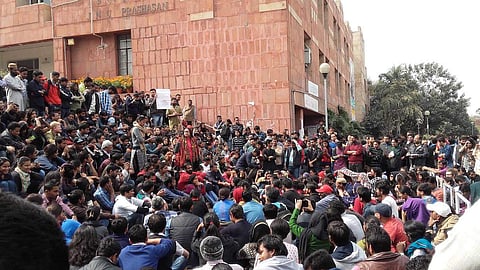

A few days ago, University of Hyderabad was in the news for charging students extra fees for staying back on campus during the semester break to avoid "trouble". Now, JNU students don't have the chance of staying on campus for more than two years, because the two courses have been disintegrated. Are the administrations in politically vibrant campuses just trying to avoid any culture of protests or debate?
Similar to the manner in which the UGC guidelines were imposed on the students without a warning, the JNU management has now imposed this new rule without prior notice. Till yesterday, JNU offered an integrated MPhil-PhD course to its students, which is of a six-year duration. No, the students have to write separate entrance exams for MPhil and PhD. But this is not the only disadvantages to the new move-
- In the past, students who manage to get a grade seven or above in their first year of MPhil have the option of skipping the second year of MPhil and directly moving on to PhD.
- Now students will not be able to skip a year and will be forced to do complete two full years of MPhil.
- Students with high grades who have just moved to PhD this academic year will now be forced to come back to the second year of MPhil and submit a thesis within the next three-four months.
- Many students might want to put in all their efforts into one solid thesis, which is why they choose to skip a year. With the new rule, students have to submit two solid theses in a span of six years which can be burdensome.
"Many science MPhil students try and get the required grade because they want to put all their concentrations into one big project. They put in a lot of effort into getting that grade for that one reason. With this new rule, they will be forced to come back and submit a thesis in the next four months. This is research it isn't a joke. A synopsis is 18-20 pages, a thesis is more than 150 pages. How can they hurriedly come with an entire thesis in a few months," said a JNU Student Union member who is also an MPhil student and realises the amount of work that goes into a thesis, "I've been going to regular meetings with my guide and spending hours in the library over the last year. To do it all in three months is unimaginable.."
"The other reason students choose to finish the course early is that they might have family constraints or they need to find a job early. It is a personal choice after all," she added.
Calling the move authoritarian, the students said that despite repeated appeals by the JNUTA and JNUSU against the proposal, the administration had gone ahead with their decision without any prior warning.
"The administration just doesn't want to have students on campus. Firstly, being on campus for that for a long duration helps you become a better academic. Secondly, being on campus for six years helps you also focus on extracurriculars, student issues, campus politics and other national issues as well. It helps us participate in social causes and work for a better society. JNU cultivates leaders and helps us become citizens that want a share in the national dialogue.Basically, the administration doesn't want the students to bond over dinners at Sabarmati dhaba, they don't want us to carry on the spirit of JNU. They simply don't want us here," she explained.
